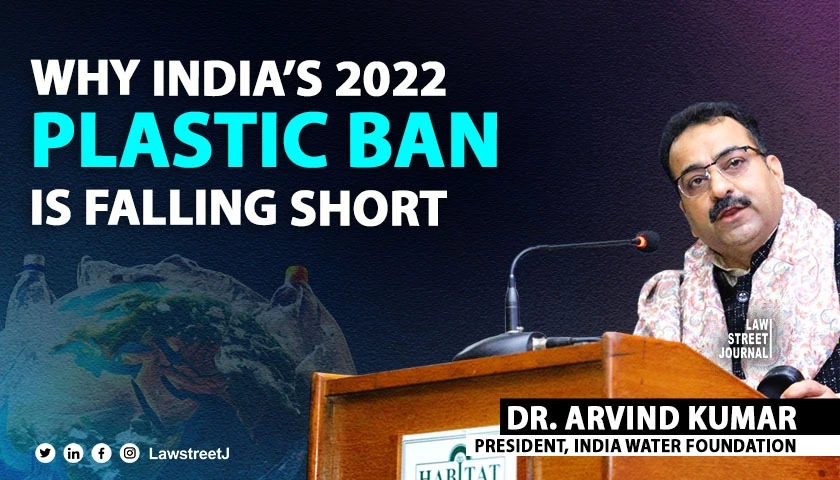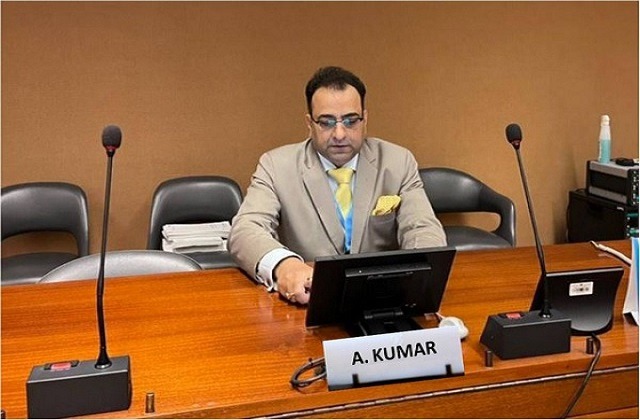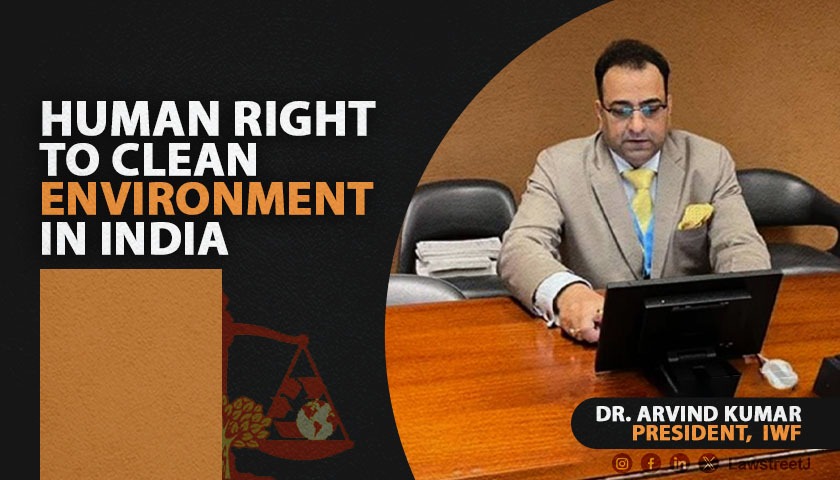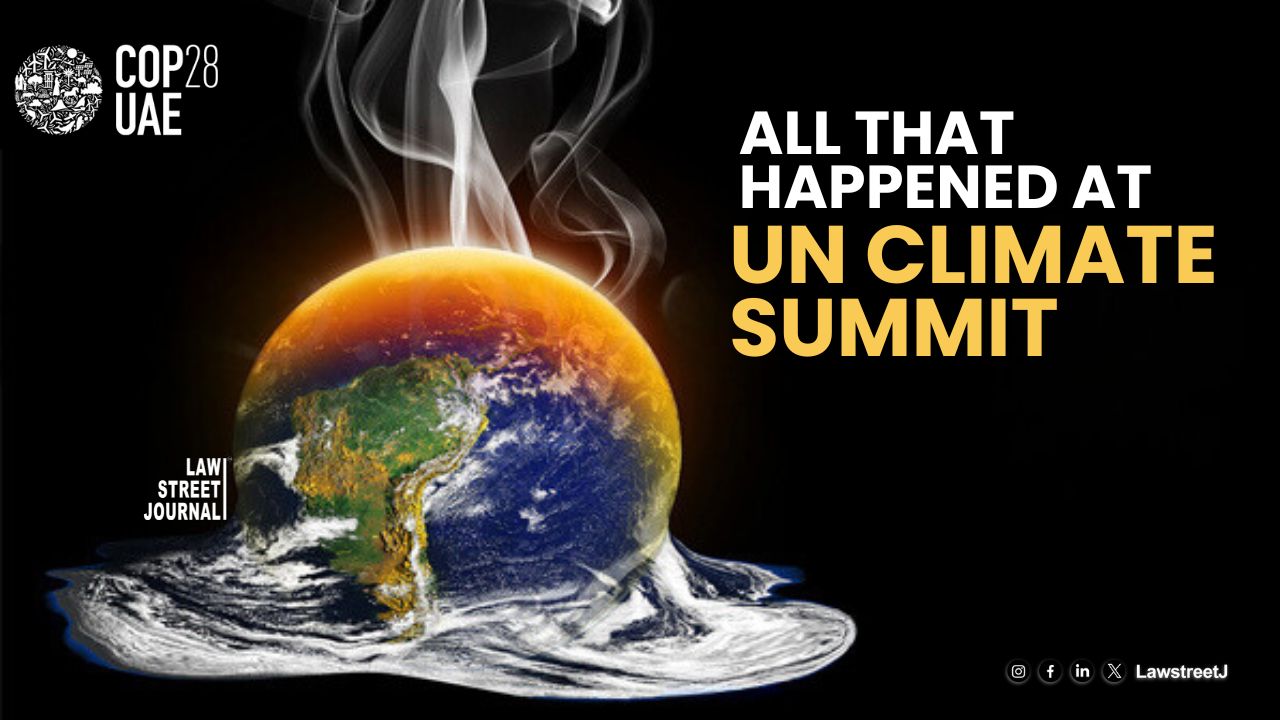No one is using plastics!
New Delhi: Single use plastics is banned, still SUPs are readily available in the market, is being used shamelessly and its waste is as abundantly found as it was two years back. Where do these SUPs come from? Are some companies producing them illegally? Do people understand what was banned and what was not? After the ban in 2022 what has changed today? Why are we unable to implement this crucial law which not only benefits our environment but also our health?
As per OECD plastics contributed to 3.4% of global greenhouse gas emissions, about 1.8 billion tons, primarily due to their production and fossil fuel conversion. Alarmingly, this figure is expected to more than double by 2060.
We are living in age that is highly disposable and consumptive. Use and throw has become a part of our day-to-day lifestyle. A large number of Indians have abandoned their traditional practices and with consumerism and increased purchasing power are adopting a highly wasteful pattern of resource use sinking into a vicious use and throw cycle. Plastic is not naturally degradable within a short period of time and if we continue to dump our plastic waste in landfills, drains, creeks, rivers or even in ponds it could choke aquatic and marine life, hamper the natural decay of other bio-degradable wastes, make water unfit for use, and because it chokes the water ways create a breeding ground for harmful bacteria. With plastic in oceans rivers and land, animals like cows, whales, birds feed on plastic. The animals eat garbage and lumps of plastic of between ten and sixty kilos have been found in their stomachs. Because the plastic cannot pass out of the stomach, the lump continues to grow until the animal dies of starvation.
In summary, the government aims to manage the littering problem by banning single-use plastic but is it really banned?
Should we only consider the economic cost of a plastic ban?
What about its impact on the environment, wildlife, and human health?
Futility of Bans and laws
In 2022, India brought into effect the Plastic Waste Management Amendment Rules (2021) that banned 19 categories of single-use plastics. These are defined as disposable goods that are made with plastic but are generally use-and-throw after a single use and include plastic cups, spoons, earbuds, decorative thermocol, wrapping or packaging film used to cover sweet boxes and cigarette packets, and plastic cutlery. However, the single-use plastic items that are banned are not uniformly enforced nationally with several outlets continuing to retail these goods. The commonly held belief that plastic is cheaply available overlooks the fact that the government has kept the price low by subsidising the polymer-producing industry. The crucial question is whether plastic costs would remain as low if subsidies were removed and stringent environmental norms enforced. Several studies have demonstrated that the accumulation of plastics in the human body can lead to inflammatory bowel disease, colon cancer, auto-immune issues, infertility and other serious health issues. Moreover, ample research indicates that microplastics are omnipresent; they pervade the air, soil and water bodies worldwide. While development is crucial, it’s imperative to assess all these costs equally for a truly sustainable growth.
There have been four meetings of the intergovernmental Negotiating Committee to Develop an International Legally Binding Instrument on Plastic Pollution, including in the Marine Environment and the negotiations are still going on. The science is clear: plastic pollution is decimating biodiversity, poisoning our water and ecosystems with chemicals, and accumulating in our bodies as micro- and nano plastics. After China, India will be the second country that pollutes waterways the most due to microplastics and chemical additives. And surprisingly at the INC 4 meeting India, considered a key representative from the Global South, submitted to INC-4 clearly stating, “There should be no binding targets/ cap with respect to production of plastic polymers.” Plastic is widely used across sectors such as agriculture, water, healthcare, etc., implying that interventions are needed to tackle plastic pollution without necessarily eliminating the use of plastic altogether. Almost 50-60 per cent of the plastic waste is packaging waste, which is mostly single-use plastic. Despite efforts to improve waste management and recycling, only about 9% of all plastic waste ever produced has been recycled. The rest is incinerated, dumped in landfills, or ends up in the environment.
Corporations’ vs Responsibility?
Although individual habits can make a difference, corporations have a significantly larger environmental footprint. Some of the world's largest and most influential companies, including Coca-Cola, Nestlé, Adidas, and Unilever, have employed avoidance strategies to delay action on plastic reduction. The global plastic crisis is one of the most pressing environmental issues of our time, and despite growing awareness of the problem and the urgent need for action, some corporations have been slow to take meaningful steps to reduce their plastic use. Plastic is ubiquitous because it is a cheap raw material and easy for industries to handle. These companies are using clever strategies to appear committed to reducing plastic use, which only slows down the process of deplastification.
Companies must stop relying on false solutions and start actively deplastifying their activities, as this is the only way to address global plastic pollution and its devastating environmental and human consequences. Consumers can reduce, reuse, and recycle to lower the demand for new plastics, but these measures alone will not solve the plastic crisis without a robust deplastification strategy. Increasing the use of recycled plastics or bioplastics cannot prevent plastic from reaching the ocean, nor can it mitigate the sanitary and human rights risks associated with plastics.
For instance, companies like Coca-Cola have become adept at discreetly fighting plastic regulations. Coca-Cola produces the largest amount of plastic waste and has been ranked the biggest plastic-polluting company since 2018. It has skilfully managed to delay, distract, and derail decisive plastic reduction regulations. Despite their environmental impact, these brands remain favourites among many consumers and use this status to justify their high levels of pollution. Companies need to embrace change and start deplastifying their activities now if they want to maintain their social license to operate and continue their activities in tomorrow's world, respecting both people and the planet. Brands have to define a “deplastification” pathway with enforceable commitments and tailored action plans that actively reduce plastics, rather than relying on solutions and marketing that may actually be increasing demand for plastics usage. Businesses are urged to evaluate the reliance on existing recycling infrastructure, as despite increased investments, competitive prices make it difficult to recycle plastic, and the continuous growth of plastic production puts added pressure on the existing infrastructure. Plastic neutrality” is another concerning practice, which contributes to delaying action and allows companies to continue using plastic by funding the collection and recycling of an equivalent amount of plastic waste in the environment, under the guise of achieving “neutrality.” To achieve this, citizens, with the support of NGOs and governments, must continue to scrutinize and denounce companies' avoidance strategies and false solutions.
Way Forward
To confront the intertwined crises of plastic pollution, global warming and biodiversity loss requires concerted action across all sectors involved in the plastic lifecycle. Cutting or limiting production is the first step. Plastic is produced because there is demand. For example, claiming that a “green” product using recycled plastic or bioplastics can “save (or clean) the ocean” is counterproductive, as that leads to an increase in sales; thus, having an even bigger negative impact on the environment. It is possible to replace some plastics by inexpensive natural substitutes and, in cases where use of plastic is unavoidable, to use the more biodegradable ones. Businesses should disclose an annual verified plastic use assessment covering all aspects of their business operations including plastics related to product production, packaging, transport, logistics, promotion, and marketing. Adequate resources and monitoring in place are required to ensure compliance and progress, with annual public disclosure of budgets and commitments. Governments can help to promote public sector research on plastics by establishing research institutes, creating industrial clusters, and supporting public-private partnerships. Going forward, closely studying the economic dynamics of moving towards plastic substitutes at further stages of the plastics cycle will help countries and communities determine the right mix of policies and incentives to fight the plastic menace head-on. It is time to see the value in all plastic and to begin to view used plastic not as a waste product, but rather as a new raw resource with infinite possibilities. The ban alone is not enough; we need to harmonise county and national laws on waste management, climate change, and conservation.
[Disclaimer: The views expressed are solely of the author and they do not purport to reflect the opinion or views of LawStreet Journal].







![NGT bars desilting, mineral extraction at Bisalpur Dam in Rajasthan without green clearance [Read Judgment]](/secure/uploads/2023/11/lj_7777_NGT_on_mineral_extraction_at_Bisalpur_Dam.jpg)







